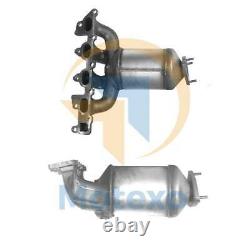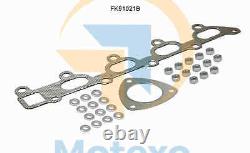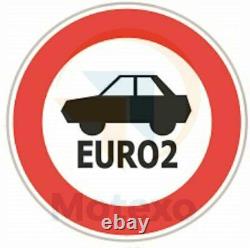Catalytic Converter VAUXHALL ASTRA 1.8i 16v Mk. 4 (Z18XE Z18XEL) 9/00-2/01





Catalytic Converter VAUXHALL ASTRA 1.8i 16v Mk. VAUXHALL ASTRA 1.8i 16v Mk. 4 (Z18XE; Z18XEL engines) 9/00-2/01 (maniverter) VAUXHALL CORSA 1.8i 16v (Z18XE; Z18XEL engines) 9/00-2/01 (maniverter) VAUXHALL VECTRA 1.8i 16v Mk. The real image should help you identify the part you need. Where available we use two images in the picture as it is the same product one picture from above and one picture from a side view for easy identification. In 1993, it became a legal requirement in the UK for vehicles to be fitted with Catalytic Converters as part of the Euro Emissions standards to improve air quality. Today, we supply direct from all the largest manufacture's in Europes and supply the largest range of Catalytic Converters with our range covering. Alfa Romeo, Audi, Bedford, Bentley, BMW, Chevrolet, Chrysler, Citroen, Dacia, Daewoo, Daihatsu, Dodge, Ferrari, Fiat, Ford, Galloper, Honda, Hyundai, Innocenti, Isuzu, Iveco, Jaguar, Kia, Lada, Lancia, Land Rover, LDV, Lexus, Lotus, Mazda, Mercedes, MG, Mini, Mitsubishi, Morgan, Nissan, Peugeot, Porsche, Proton, Renault, Rover, Saab, Ssangyong, Seat, Skoda, Smart, Subaru, Suzuki, Toyota, TVR, Vauxhall/Opel, Volkswagen, Volvo. What are they and how do they work? A Catalytic Converter (Cat) is an emissions control device that reduces the level of harmful exhaust gasses that enter the atmosphere. It works by converting exhaust emissions into less harmful ones when the gasses pass through it, triggering a chemical reaction. EU Emissions Standards are subject to amendment from time to time, for example, vehicles made after March 2001 (Y-reg onward) are now required under UK law to be fitted with type-approved, homologated Cats. Anything from Euro 3 onward are classed as H-parts and can be identified in the BM range by a H suffix. BM Catalysts work tirelessly to keep up-to-date with these standards and develop our parts to meet the ever-changing needs of both the industry and our customers. Understanding Emissions Reports A vehicle will fail an emissions test on either, or all, of the following factors:Carbon Monoxide (CO) Levels Hydrocarbons (HC unburned fuel) Lambda ReadingCO Failure can mean several things, but is most likely caused by a poorly running vehicle. If a Cat becomes contaminated with unburned fuel, it will become unable to effectively convert the gasses that pass through it. A new Cat at full capacity will almost certainly lead to a MOT pass, but unless the fault is rectified, the customer will return the next year complaining of the same problem. HC Failure is an indicator that the vehicle is over-fuelling. A vehicle will fail on this reading if it has HCs in excess of 200ppm. HCs in excess of 60ppm indicates a vehicle problem that needs rectifying as soon as possible. Lambda Failure means there is a problem with the air:fuel ratio on the vehicle. If the lambda reading is less than 0.97, the vehicle is running too rich. If the lambda reading is greater than 1.03, the vehicle is running too lean. Catalytic Converters fail for many reasons as mentioned above. In many cases, the failure has little to do with the Cat itself, but instead is the result of another fault within the vehicle. It is important to rectify any problems before a new Cat is fitted. When a vehicle fails an MOT emissions test, the blame is usually placed on the Cat.
However, the Cat can only convert what gasses pass through it; if the vehicle is running poorly, the Cat will become contaminated with unburned fuels and become unable to convert the gasses efficiently. If the Cat is replaced without fixing the vehicle fault, it is highly likely it will pass the MOT test as the new Cat is working at its full capacity and will mask and fault. A tell-tale sign of a vehicle that has not been repaired is that they will return a year after failing the original MOT having failed the test again.
Again, this helps speed up the gas conversion process and helps the Cat avoid any unnecessary build-up of unburned fuels that could impact on the effectiveness of the part and could cause damage to it. Type Approved Catalytic Converters Huge range of 103R compliant catalytic converters Increase in efficiency due to higher loadings of precious metals Direct Fit Type Approval Unique approval number for each BM part number Our parts are Type Approved in order to conform to the current UK legislation laws which have been in force since August 2009. The law states that for vehicles registered on or after 1st March 2001, all replacement catalytic converters and CAT-DPF units must meet the set standards for emissions before they are granted with approval. Each part numbers carries a unique EC Approval number which is pin stamped onto the part. They are also denoted by the H suffix.
- Manufacturer Part Number: BM91021
- Brand: BM Catalysts
- Type: Catalyst










